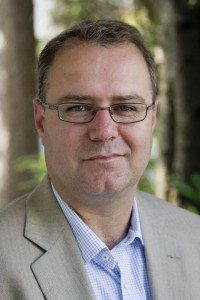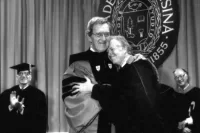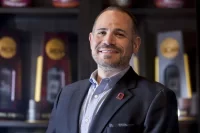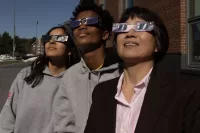For new director of Bates Career Development Center, some déjà vu
As an undergraduate at the University of Sunderland in northeast England in the early 1990s, David McDonough was looking for a different experience when he was accepted to an exchange program at the University of Maine, at Orono, which looked to him like “an interesting location.”
Irish by descent and the son of a British navy officer, McDonough had also lived in Malaysia and Bermuda as a child, as well as the UK, and served in the navy himself before working a couple of years reviewing school building and maintenance work throughout England for the country’s department of education.
But a year in Maine had a particular impact on his life, not only familiarizing him with a very distinctive American state but also introducing him to a fellow UM student who would become his wife — and two decades later helping lead him to Lewiston, where on Aug. 1 he became director of the Bates Career Development Center (BCDC).
McDonough said that the character of Bates and the capabilities within BCDC, along with a love of Maine, led him here, with his wife Amy (a biologist who is a Maine native) and their 3-year-old daughter, Fiona.
“I like the global-mindedness of Bates students, their communications skills and the breadth of their academic and career interests,” he said. “I also found the BCDC staff to be terrific and feel that the operation is really poised to go to the next level.”
Another aspect of the Bates career services operation that appeals to McDonough is “the fact that we’ll be reporting through the academic side, to the dean of the faculty — which is fairly uncommon,” he said.
“This is a big plus because faculty have such regular interaction with students, and students have such a high regard for them. The reporting relationship will help us get more directly involved with faculty and be in a better position to benefit students.”
McDonough will bring to BCDC a history of strengths in external relations, counseling for a wide variety of students and alumni, management and innovation, particularly in utilization of technology. He said, “I’ve always enjoyed setting up technological systems in career services, but as I got more into the work, it was the one-to-one work with students that excited me most.”
He earned a bachelor’s degree in geography and politics at the University of Sunderland and a diploma in logic and technology from the University of Dundee; entered human resources and career-services work at Motherwell College and Napier University (in Scotland); and moved permanently to the U.S. in 1997, working as a career information specialist for Boston University, associate director of the Brandeis University career development center and then director of career services at Clark University for seven years.
McDonough’s commitment to liberal arts education is reflected by his recent service as executive chair and executive board member of the Liberal Arts Career NetWORK (LACN) – a role in which he led the organization through a technology platform change, enhanced the number of opportunities for students and alumni, created goals for the organization and hired its first staff members.
“The leaders of tomorrow are going to be creative innovators with global understanding who work in international teams,” he said. “All kinds of top leaders today have a liberal arts background. We’re in a position to help students understand how to utilize the top liberal arts education they’ll get at Bates in so many ways.”




